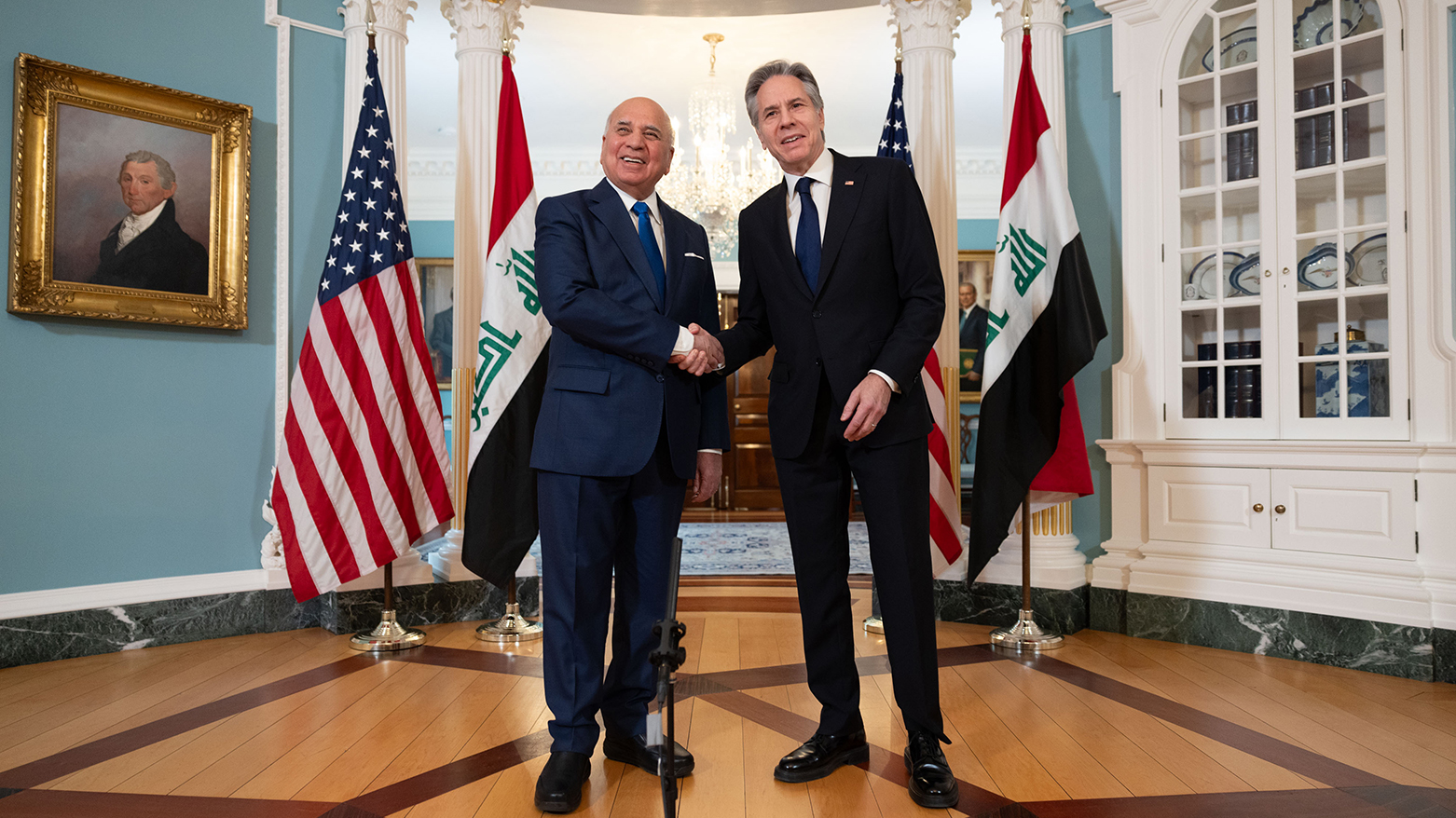U.S. Encourages Better Ties Between Baghdad and Erbil, including Resumption of KRG Oil Exports

WASHINGTON DC, United States (Kurdistan 24) –U.S. Secretary of State Antony Blinken met with Iraqi Deputy Prime Minister and Foreign Minister Fuad Hussein on Tuesday.
Hussein has been in Washington since Friday to prepare for the visit of Iraqi Prime Minister Mohammed Shia’ al-Sudani next month.
Read More: Iraqi Prime Minister to Make First Visit to Washington
Sudani’s visit follows that of the Kurdistan Regional Government (KRG) Prime Minister, Masrour Barzani a month ago.
Read More: U.S, KRG Hail ‘Long Partnership,’ as Blinken, Barzani Meet
Together, the two visits signal a major new U.S. Initiative to address problems in Iraq that the administration had previously ignored in the mistaken belief that the Middle East was quiet and they were, in fact, handling the region better than their predecessors.
Of course, Hamas’s bloody Oct 7. cross-border assault on Israel revealed that as a total illusion.
Indeed, if that was also the view of U.S. intelligence—the Middle East was quieter than it had been in two decades—then there was also a major intelligence failure in addition to a policy failure.
Blinken-Hussein Meeting
In Tuesday’s meeting, Blinken raised the issue of relations between Iraq’s federal government and the Kurdistan Regional Government (KRG), including the issue of the KRG’s oil exports, which have been blocked for over a year.
“The Secretary encouraged efforts to enhance the Baghdad-Erbil relationship,” the U.S. read-out of their meeting stated. This, it added, would “bring economic benefits to all Iraqis, improve Iraq’s energy independence, strengthen Iraq’s ability to fully exercise its sovereignty, and promote stability and security for all Iraqis.”
The importance of re-starting KRG oil exports was underscored in the State Department press briefing on Tuesday.
State Department Spokesperson Matthew Miller affirmed, “The U.S. has been engaged at the most senior levels” on this issue, “and we have urged all parties to reach an agreement to resume the flow of oil through this pipeline [to Ceyhan, Turkey.]”
“We believe that restarting oil exports through the pipeline would be mutually beneficial to all parties,” he continued, “and because of that reason, that’s why we’ll continue to pursue it.”
Same Point Made by White House
Hussein arrived in Washington last week. Among his first meetings was one at the White House with Amos Hochstein, Special Presidential Coordinator for Global Security and Energy Security.
Hochstein “expressed his country’s readiness to enhance ways of cooperation, especially in the field of energy, oil, and gas, hoping to solve the oil issues between the Federal Government and the Region,” according to the Iraqi read-out of their meeting.
Thus, the U.S. has made its position clear: it wants to see KRG oil exports resumed. But it remains to be seen just how and when that will happen.
U.S.-Iraq Higher Military Commission
Last summer, the U.S. and Iraq announced that they intended to launch what they called the Higher Military Commission (HMC.) In January, they announced that the HMC’s meetings would begin shortly.
As the U.S. made clear, these were not meetings about the withdrawal of U.S. forces from Iraq. Rather, they were about shifting the basis of the U.S. military presence in Iraq from the multilateral anti-ISIS Coalition to a bilateral defense relationship, given the diminished threat from ISIS following nearly a decade of the shared fight against the terrorist organization.
Read More: Pentagon: US, Iraq to Discuss Future Security Cooperation—not Troop Withdrawal
In their meeting on Tuesday, Blinken and Hussein “reaffirmed their commitment to the Higher Military Commission process,” the U.S. read-out said, explaining that it “will enable the transition to a durable bilateral security partnership between Iraq and the United States and help to ensure the enduring defeat of ISIS.”
Whether Friday’s terrorist attack in Russia—which killed 137 people and which an Afghan-based branch of ISIS claimed credit for—will affect those discussions remains to be seen.
Just before their meeting, both Blinken and Hussein said that the attack on the Moscow concert hall showed that ISIS remained a significant threat.
“Despite the very good work that we’ve done over the years” in confronting the ISIS threat, Blinken said, “and mitigating it significantly, we’re reminded by the horrific attack outside of Moscow just a few days ago that ISIS remains a potentially potent force and one that we have to continue to deal with.”
Hussein concurred, affirming, “This means that ISIS is still a threat to peace in the Middle East, but also to security and peace” elsewhere.
That is also the view of the KRG. As the KRG’s Interior Minister, Reber Ahmed, told Kurdistan 24, “The terrorist attack in Moscow tells us that terrorism is not over.”
Read More: Moscow terror attack underlines ongoing threats of terrorism, KRG Minister of Interior
Indeed, that perspective was also expressed by the President of France, which is a significant contributor to the anti-ISIS coalition.
Emmanuel Macron said on Monday that the branch of ISIS, ISIS-Khorasan, which claimed credit for the Moscow attack, “had over the past months carried out several [attempted] attacks on our soil.”
One of those attempted attacks was in eastern France, in Strasbourg, the French Prime Minister explained.
